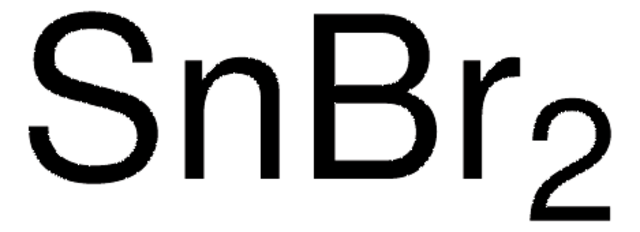901437
Formamidinium bromide
≥99%, anhydrous
Synonym(s):
Formamidine hydrobromide
About This Item
Recommended Products
grade
anhydrous
Quality Level
Assay
≥99%
form
powder or crystals
greener alternative product characteristics
Design for Energy Efficiency
Learn more about the Principles of Green Chemistry.
sustainability
Greener Alternative Product
greener alternative category
SMILES string
N=CN.[H]Br
Looking for similar products? Visit Product Comparison Guide
General description
Application
Storage Class Code
11 - Combustible Solids
WGK
WGK 3
Flash Point(F)
Not applicable
Flash Point(C)
Not applicable
Choose from one of the most recent versions:
Certificates of Analysis (COA)
Don't see the Right Version?
If you require a particular version, you can look up a specific certificate by the Lot or Batch number.
Already Own This Product?
Find documentation for the products that you have recently purchased in the Document Library.
Customers Also Viewed
Articles
To achieve net-zero emissions by 2050, renewable power contributions must triple. Photovoltaic stations provide vital utility power, achieved primarily through third- and fourth-generation technology. Promising trends include recycling and revolutionary, ultra-lightweight, flexible, and printable solar cells.
To achieve net-zero emissions by 2050, renewable power contributions must triple. Photovoltaic stations provide vital utility power, achieved primarily through third- and fourth-generation technology. Promising trends include recycling and revolutionary, ultra-lightweight, flexible, and printable solar cells.
To achieve net-zero emissions by 2050, renewable power contributions must triple. Photovoltaic stations provide vital utility power, achieved primarily through third- and fourth-generation technology. Promising trends include recycling and revolutionary, ultra-lightweight, flexible, and printable solar cells.
To achieve net-zero emissions by 2050, renewable power contributions must triple. Photovoltaic stations provide vital utility power, achieved primarily through third- and fourth-generation technology. Promising trends include recycling and revolutionary, ultra-lightweight, flexible, and printable solar cells.
Our team of scientists has experience in all areas of research including Life Science, Material Science, Chemical Synthesis, Chromatography, Analytical and many others.
Contact Technical Service


![4,9-Dibromo-2,7-bis(2-octyldodecyl)benzo[lmn][3,8]phenanthroline-1,3,6,8(2H,7H)-tetrone](/deepweb/assets/sigmaaldrich/product/structures/100/693/87f6ccae-153b-4ba6-bd0a-653ba06ece22/640/87f6ccae-153b-4ba6-bd0a-653ba06ece22.png)






![Spiro[9H-fluorene-9,9′-[9H]xanthene]-2,2′,7,7′-tetramine](/deepweb/assets/sigmaaldrich/product/structures/225/593/3b5858b3-0993-43eb-97ee-3f0d2a1142dc/640/3b5858b3-0993-43eb-97ee-3f0d2a1142dc.png)



